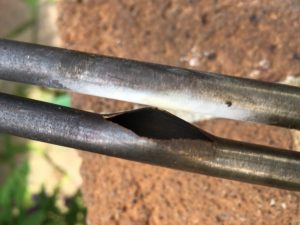HOPE TO BE BACK TO HOUSECALLS AFTER AUGUST 7, 2019 🚑👍. Your pet is suddenly limping and/or holding up a leg or can’t get up. What do you do ? Does my pet need immediate veterinary emergency help ? Can I wait until morning or later ? Can I wait a few days and see how it goes ? CAN’T GET UP AT ALL : If your pet appears in pain (crying, yelping, meowing nonstop, etc) or bleeding or something else very obvious your pet probably needs emergency ASAP Veterinary attention. Trying to move them and get them into a car could cause them to snap at you out of fear and/or pain. A housecall vet can save a lot of trouble in these cases. But if not an option, blankets and towels can serve as makeshift gurneys for carrying many pets. A large travel cage is the best option if possible. Towels can also be good to wrap them in to carry and keep steady as well as placed over their heads to ease their fear and hopefully keep their teeth out of you if a muzzle is not an option. MY PET SEEMS GENERALLY OK BUT IS LIMPING OR NON WEIGHT-BEARING ON A LEG : Treating this the same way as above is never a mistake. Getting them seen by your vet can prevent the worsening of injuries. That being said , sometimes, like with people, your pet may have just jumped/landed awkwardly and gotten a slight sprain. This is where an extra large travel cage comes in. Your pet’s injury/strain is immediately safer if they have to lie down and take it easy. Sometimes all it takes is a few hours or less and they might be fine. Just like us sometimes they stub their toes, bang their knee on something, or take a bad step and just need to take it easy for a little while. If things don’t seem to improve with a little cage rest (or close them off in a small room if no cage available at that moment) or seem worse…it’s probably time to call the housecall vet or get to the vet. Hope it’s nothing serious ! Good luck, Dr Thomas M. Pickard VMD. Call Allpets Housecalls 215-843-1780
Category Archives: Housecall Vet
Leg Injury and Your Pets
Allpets Housecalls is on a hopefully BRIEF hiatus from doing Housecalls in the Philadelphia area. A metal rod 
electric device used to light charcoal grills had an explosion in it and it smashed into my right calf at a million miles an hour. This soon after resulted in a complete rupture of my right Achilles’ tendon. An injury that in humans can take 4-12 weeks to get back to work depending on your injury extent and depending on your job physicality. I haven’t blogged in a bit so going to publish this as part 1. Part 2 will be coming up concerning how to treat these type of leg injuries with your pets. Look for plenty more blog posts. This injury thing is pretty boring. Thanks for reading, Dr Thomas M. Pickard VMD of ALLPETS HOUSECALLS. 215-843-1780. HOPE TO BE BACK TO HOUSECALLS STARTING AFTER AUGUST 7, 2019 🚑👍
Lyme Disease and Dog Aggression
Many people have tragically put their dogs down due to unexplained aggression. A perfectly nice dog has moments of growling, biting, fear-aggression, or just plain aggression. Never put down a dog with aggression problems until they have been tested for Lyme disease. Lyme is known to cause this behavior as well as other neurologic symptoms such as canine confusion, irritability, and disconnected type behavior. A simple blood test will tell you if they have Lyme disease. Dogs respond much better to the treatment with Doxycycline (2-5mg per lb body weight once or twice daily for at least 14 days…30 is better…and some chronic (long-term) cases could be on it for months…and possibly need retreatment for relapses or re-infections (a new Lyme tick bite) ). Dogs are known to respond much better than people, even with chronic infections. Don’t forget to consider getting yourself tested too. Your dog probably got it while on a walk with you. Ticks love us too.
Shots for Pets : Should You Get Your Pets Vaccinated ?
 In regards to vaccines: The number one way that dogs and cats are different from human beings is that they go out of their way to seek out and inhale other creatures fecal matter and urine. I’m presuming most people do not do this. That is a good thing because that is why animals are exposed to so many viruses so frequently (let alone worms and other parasites). In Dogs: Distemper. Parvo. Hepatitis. Leptospirosis. Canine Influenza. Coronavirus. Canine Herpes virus. In cats : Feline Leukemia. Feline Panleukopenia. Feline Rhinotracheitis. Calicivirus. Many of these (except Rabies transmitted by bites and scratches) are transmitted by sniffing infected feces and or urine. Most dog’s and cat’s favorite activity. Once a month boosters (except Rabies) starting at 4-6 weeks and finishing with a final booster and Rabies at 16 weeks old is the basic schedule. Momma cat or momma dog’s first milk blocks our vaccines. But it could stop blocking early (now pet can catch viruses) or it could stop blocking late (none of our vaccines worked yet). Please see a veterinarian and get your pets on the proper vaccine schedule to keep them from getting very sick and possibly dying. Also, don’t let them outside on public sidewalks or parks until they are done their first year’s shots because that’s where the viruses are. Vaccines after year one range from boosters every year to some longer lasting vaccines. To protect your pet properly with vaccines and detect illnesses and problems early have them see a vet every year…even if they seem fine to you.
In regards to vaccines: The number one way that dogs and cats are different from human beings is that they go out of their way to seek out and inhale other creatures fecal matter and urine. I’m presuming most people do not do this. That is a good thing because that is why animals are exposed to so many viruses so frequently (let alone worms and other parasites). In Dogs: Distemper. Parvo. Hepatitis. Leptospirosis. Canine Influenza. Coronavirus. Canine Herpes virus. In cats : Feline Leukemia. Feline Panleukopenia. Feline Rhinotracheitis. Calicivirus. Many of these (except Rabies transmitted by bites and scratches) are transmitted by sniffing infected feces and or urine. Most dog’s and cat’s favorite activity. Once a month boosters (except Rabies) starting at 4-6 weeks and finishing with a final booster and Rabies at 16 weeks old is the basic schedule. Momma cat or momma dog’s first milk blocks our vaccines. But it could stop blocking early (now pet can catch viruses) or it could stop blocking late (none of our vaccines worked yet). Please see a veterinarian and get your pets on the proper vaccine schedule to keep them from getting very sick and possibly dying. Also, don’t let them outside on public sidewalks or parks until they are done their first year’s shots because that’s where the viruses are. Vaccines after year one range from boosters every year to some longer lasting vaccines. To protect your pet properly with vaccines and detect illnesses and problems early have them see a vet every year…even if they seem fine to you.
Pet Winter Safety
 The 2 main problems I see with pets in the Winter (cold-weather locations) are : 1) Extreme Cold and 2) Salt Burns. There are only so many things you can do for extreme cold. 1) Limit outdoor exposure when below freezing. My dog is a Welsh Terrier and he has a thick undercoat and thick outer-coat. He can sit in the snow and cold for hours if I let him but even his pads can get frostbite. Go out to the bathroom or for a walk and then come inside. Limit to an hour. Pets with less fur need coats, sweaters, and yes, even boots (some tolerate these slip-on rubber shoes or boots…others don’t). These booties also can help avoid salt burns. If you can’t avoid the salt rinse your pets’ feet with warm water as soon as coming inside. Prolonged contact with salt can particularly burn up inside the fragile skin between their pads. This may require a vet’s attention. Remember if you are cold your pet likely is too.
The 2 main problems I see with pets in the Winter (cold-weather locations) are : 1) Extreme Cold and 2) Salt Burns. There are only so many things you can do for extreme cold. 1) Limit outdoor exposure when below freezing. My dog is a Welsh Terrier and he has a thick undercoat and thick outer-coat. He can sit in the snow and cold for hours if I let him but even his pads can get frostbite. Go out to the bathroom or for a walk and then come inside. Limit to an hour. Pets with less fur need coats, sweaters, and yes, even boots (some tolerate these slip-on rubber shoes or boots…others don’t). These booties also can help avoid salt burns. If you can’t avoid the salt rinse your pets’ feet with warm water as soon as coming inside. Prolonged contact with salt can particularly burn up inside the fragile skin between their pads. This may require a vet’s attention. Remember if you are cold your pet likely is too.
#PetSkinItching
Allergies to pollens and other things in the world manifest in cats and dogs as skin itching. Unlike people who get sneezing and runny nose and eyes cats and dogs ears and skin become itchy and inflamed. They often will pull out the hair in the area and chew and scratch their skin bloody. Often this is confused for mange or fleas. Although these other problems must be ruled out, the number one cause I see is seasonal pollen allergy. Often we can treat this with short-term low-dose corticosteroids. If it’s not too severe an attack antihistamines often work with less side effects than steroids.
My Dog or Cat is Shaking their head and Chewing their Fur off
Allergies, allergies, allergies. The number one problem I see. Instead of sneezing dogs and cats get skin (including ears) itching. Just like people there really isn’t a cure you just need medicine while it’s happening. A quick cortisone shot followed by more cortisone pills and/or some antihistamines often does the trick. Secondary bacterial and yeasy infections can occur with allergies. See your vet or call us at 215-843-1780 to clear things up before they get worse and you and your pet can sleep at night.
Your Dog or Cat is Itching, Scratching, Chewing their Fur or Feet, and/or Shaking Head
Your Cat or Dog is scratching their ears, shaking their head a lot, licking their feet, ripping their hair out, chewing their hair into bald and sometimes bloody messes. Why? It might be FLEAS but I bet it could be dog or cat allergies. Same stuff we humans are allergic to. You know how sometimes your eyes and throat get itchy if you are a human sufferer? Anywhere they have skin they can be ITCHY . A LOT or a little. This is the number one HOUSE CALL VET problem we see. Period. Let us see your pet in their own environment. ALLPETS HOUSECALLS . Thomas M. Pickard VMD
Fleas
Starting to see more and more FLEAS…time for flea and tick preventative…wish I could tell you the cheap flea products work…but they don’t.
Surgery Tumor Removal on English Bulldog
Picked up “Daisy” the English Bulldog in Port Richmond, Fishtown area. Had to perform surgery to remove a skin tumor enlarging on her back. Owners worried it was malignant cancer. Biopsy clear. Most of our exams are in the home as house calls. But we also do pickups and dropoffs for surgery and dentistry. Call for appointment Allpets Housecalls 215-843-1780
ALLERGIES AND FLEA REACTIONS LOOK ALIKE…HOUSECALL VETS PHILADELPHIA
That excessive itching your dog or cat are doing may not be fleas. Allergies to pollen is the number one problem we see this time of year. Call Allpets Housecalls , Dr Thomas Pickard to schedule an appointment. 215-843-1780 Housecall Vets Philadelphia


